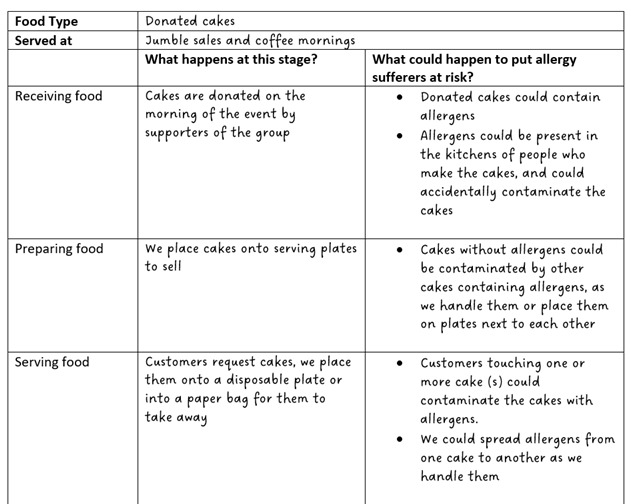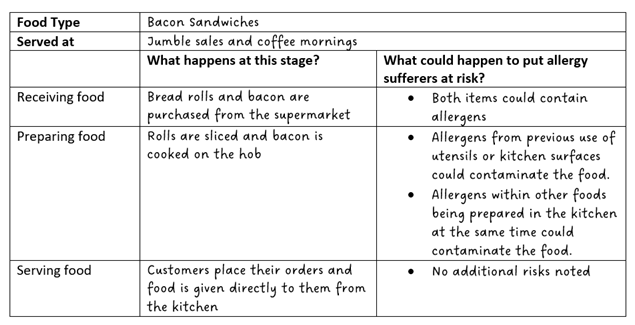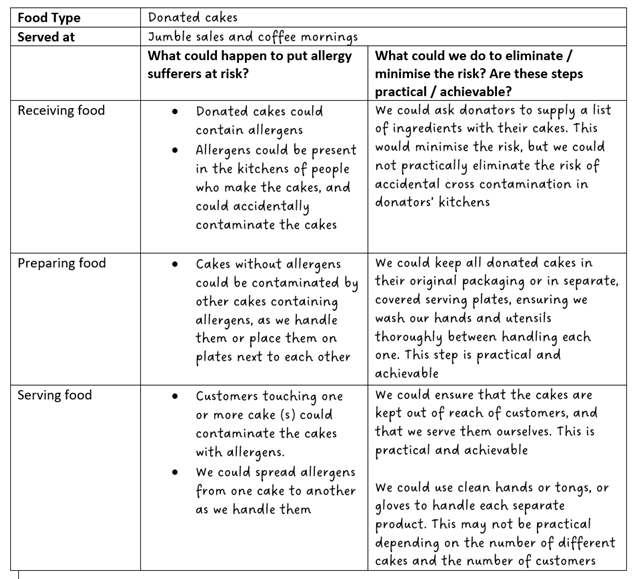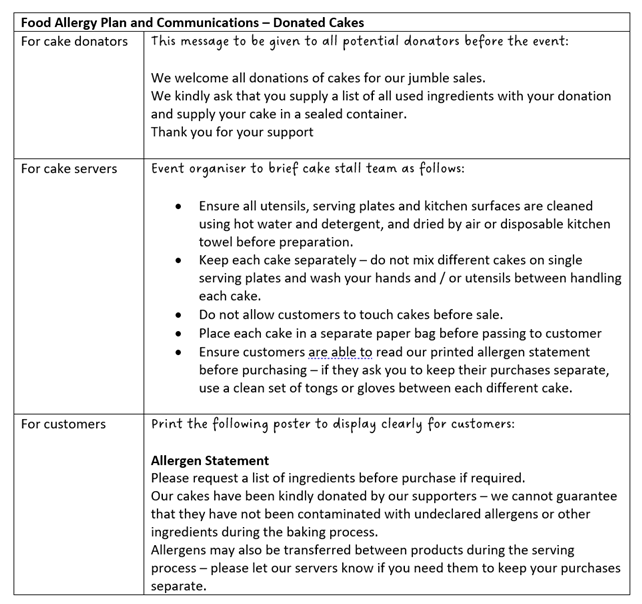Food allergy management for community groups and charities


It can often be difficult to apply effective allergy management for charities or community groups. This is down to several unavoidable difficulties in the sector. These can include:
The key factors to managing allergens safely in a community organisation setting are the same as in a commercial setting: accurate risk assessment, easy-to-follow processes and clear communication.
Unless your organisation is registered as a food business, you will not be subject to many of the food allergen laws, including the latest ‘Natasha’s Law’. Organisations that supply food on an occasional and small-scale basis usually do not need to register as food businesses. However, if you provide food on an organised and regular basis, you’ll need to register with your local authority. Follow this link to the FSA guidance
Regardless of whether you are a food business, food legislation provides a good framework to help you operate safely. Here is some key information about food allergy law that will help you operate safely:
There are 14 allergenic ingredients listed by the Food Standards Authority. These ingredients – or allergens – are those most likely to cause an allergic reaction. In law, registered food businesses must declare their use to their customers. Here’s a useful poster of those 14 listed allergens.
Other ingredients can also be allergens, even if they don’t appear on the list. Ingredients such as strawberries, kiwis, and peas are increasingly causing allergic reactions. As a result, it is always useful to have a list of all ingredients contained within any food you offer.
Food ingredients labelling depends on how the food is packaged. Food classified as ‘pre-packed’ has a different labelling requirement from food ‘pre-packed for direct sale’. This is different again from food sold ‘loose’. For further information, see our post about Natasha’s Law.
Even if your charity is not a registered food business, managing allergies is important. Whilst you may not be subject to the same legal restrictions, you still owe a moral duty to keep customers safe. Training all of your volunteers in food safety and allergen management may not be an effective or proportionate solution, but it is often reassuring to have one or two experts trained up and ready to advise. The Safer Food Group offers cost-effective, flexible online training, with discounts for larger organisations. Get in touch if you’d like to find out more.
Whether or not you have a trained expert on your team, it is sensible to risk assess your food operations and make any necessary adjustments. Think about the journey your food products take, from ingredients through production to serving. Do all of your food products take the same journey? For instance, do you produce all your food in house, or do you also accept ready-to-sell donations? If not, you’ll need to run through this assessment for all the different categories of foods.
Here’s a simple matrix that can help you start to think about the journey your food takes, and the risks that might be introduced along the way. This matrix is based on a real example, but it is important that you consider your own organisation carefully and make adjustments for the way you operate. At this stage, just concentrate on allergens, but you could use a similar approach to general food hygiene and safety. To keep things clear, you should undertake this process for each different type of food you serve:


Next, you must make a decision. Can you eliminate those risks, can you minimise the risks, or are the risks impossible to mitigate? Taking donated cakes as an example:

Looking at the risks and measures you’ve identified, come up with an achievable plan. Think about the way you will communicate the plan with everyone involved. In this case, this includes donors of cakes, those preparing and serving the cakes, and your customers. Don’t forget, if you are working with inexperienced volunteers, you will need to consider what actions may be too complicated or onerous.

In this example, you’ll see that the risk has not been eliminated completely. Instead, steps have been taken to minimise allergen contamination, and the risks are communicated clearly to customers. As a minimum, we must enable allergy sufferers to make an informed choice about whether or not they can safely eat our food.
Once you’ve risk assessed and created a plan, do a ‘dry run’ to check your thinking. Go back and adjust any areas that haven’t worked out as you expected.
Dealing with food allergies can be daunting for a food professional, let alone a volunteer who is serving cakes at a jumble sale. Some may be reluctant to change from current methods; others may struggle to acknowledge the seriousness of food allergies. It is important for those in leadership roles to convey the importance of good practice whilst being sympathetic to those reluctant to change.
This can be made easier by asking a small team of volunteers to become food safety experts within your group. Both food hygiene and food allergy management training can be easily accessed and flexible. The Safer Food Group offers online Food Hygiene Level 2 or Food Allergy Awareness Level 2 for £12 + VAT per course. For larger groups, volume-based cost savings can reduce course prices to £6 per course. This may be ideal if you can purchase on behalf of a larger district or region. Once you have experts in place, they can take an active role in creating safe processes and disseminating key information to other group members.
Looking for more?
Further information for voluntary and charity organisations can be found on our Knowledge base, including:
Join 950,000+ learners
Explore our award winning online video based training
The Safer Food Group
Unit 2, Integrity House,
Lower Lumsdale, Matlock
DE4 5EX
Back
to top
© The Safer Food Group 2025 | Privacy policy